19 Jan 2016
By Belle
Building habits that make me happy
I’m just about to launch an email course on building productive habits, so I’ve been thinking a lot about the habits I’ve built so far. My biggest wins have been reading every day, learning French, and getting up early. After being sick for a few weeks, and struggling to keep up with my regular habits, I’m focusing on learning French every day right now to build up this habit again.
When I put together my 2015 review recently, I made a list of habits I want to build in 2016. I included playing piano every day, flossing, and exercising. These are habits I wish I had, and I’m committed to building them, but I realised I ignored the very useful data Exist has about me when I made this list. And, since I have room for a few more habits I can work on this year, I figured I should have a go at expanding my list.
The main thing I wanted to get from Exist was to figure out what my best days look like. I’ve been rating my mood in Exist most nights for over a year now. That’s a lot of data about what makes me have a great day, and what makes me have a bad day. Of course, correlation does not equal causation, but it’s a start to help me figure out what does cause those good and bad ratings.
So I dug through the data to see what a great day looks like, since I want to have more of those, and what a bad day looks like, so I know what to avoid.
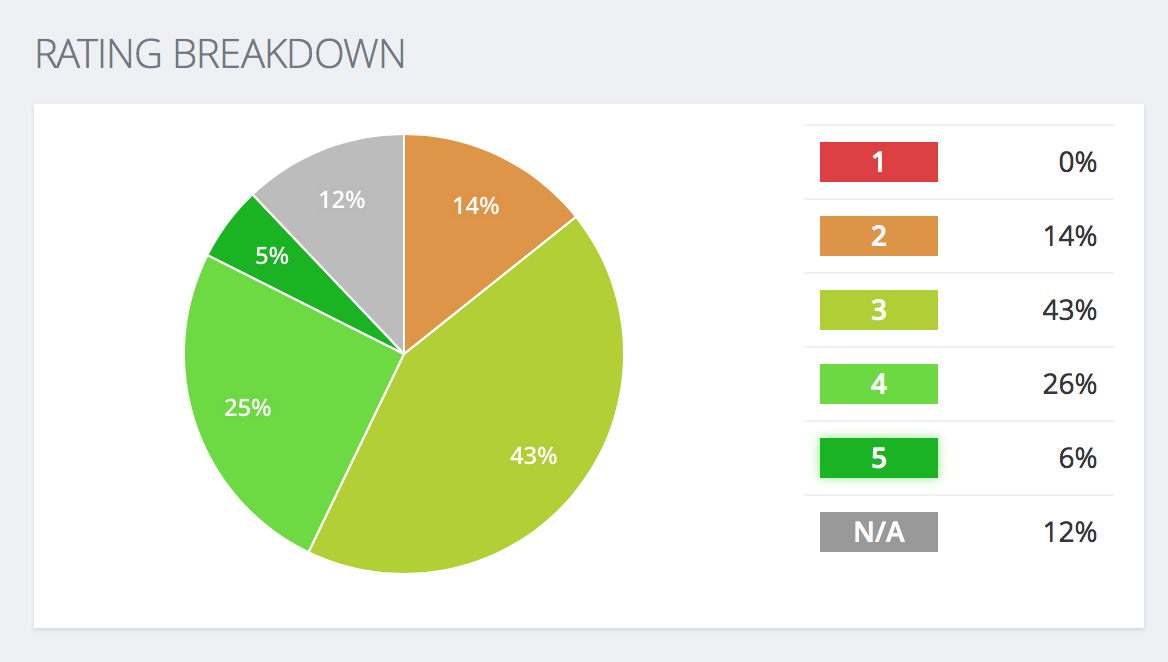
The first thing I noticed when I went digging into my mood data in Exist was the breakdown of each rating from 1-5 (1=terrible, 5=perfect). I mostly have average days, rated 3/5. My next biggest chunk is 4/5, which is more than a quarter of my days. But perfect 5/5 days only account for 6% of my days. Although I’d love to have more 5/5 days, this made me think it’s probably more realistic to aim for lots more 4/5 days. There’s more data to work with for those ratings, and they’re already more likely to happen. Perfect days are clearly hard to get.
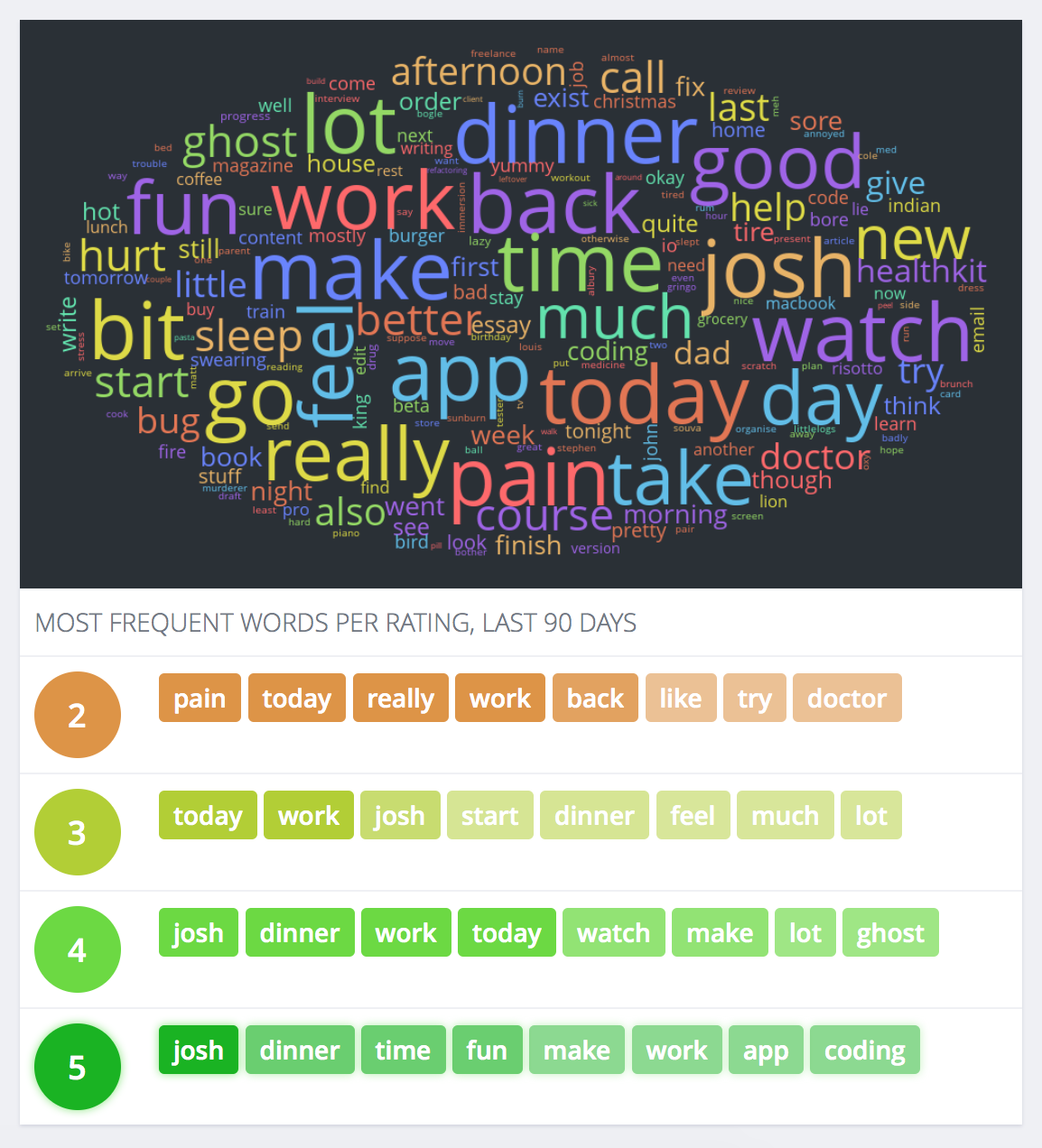
So, next I checked out what I talk about most in my notes when I rate a day 4/5. The four most common words I use on good days are josh, work, dinner, and today. I like the feeling of being productive, so I guess I might say “I did a lot of work today” on good days. I’m not surprised I talk about Josh and what I had for dinner on good days—both can improve my mood quite easily! The next four most common words included ghost, which is sad because they fired me, so I can’t have any more good days working there. It also included watch, lot, and make. “Make” probably comes up when I talked about what we cooked for dinner, and “watch” usually refers to spending time with Josh watching a show we both enjoy.
However, when I took into account what I talk about on days with a 3/5 or 5/5 rating, I realised I mention Josh almost every day, so that doesn’t really help me figure out what makes me have a good day. I do know from experience that I often mention what Josh was doing during the day, but on good days I’ll talk about things we did together, like playing a game or going out for brunch. I also talk about dinner most days, regardless of the rating, but I mention it more often when I rate my day higher. I guess that means the better my dinner is, the more likely I am to have a good day and to mention dinner… maybe.
I got a couple of clues from the note analysis, but mostly my notes are just a record of the main things that happened that day. I dug into my correlations to see what actually happens most often when I’m having a good day.
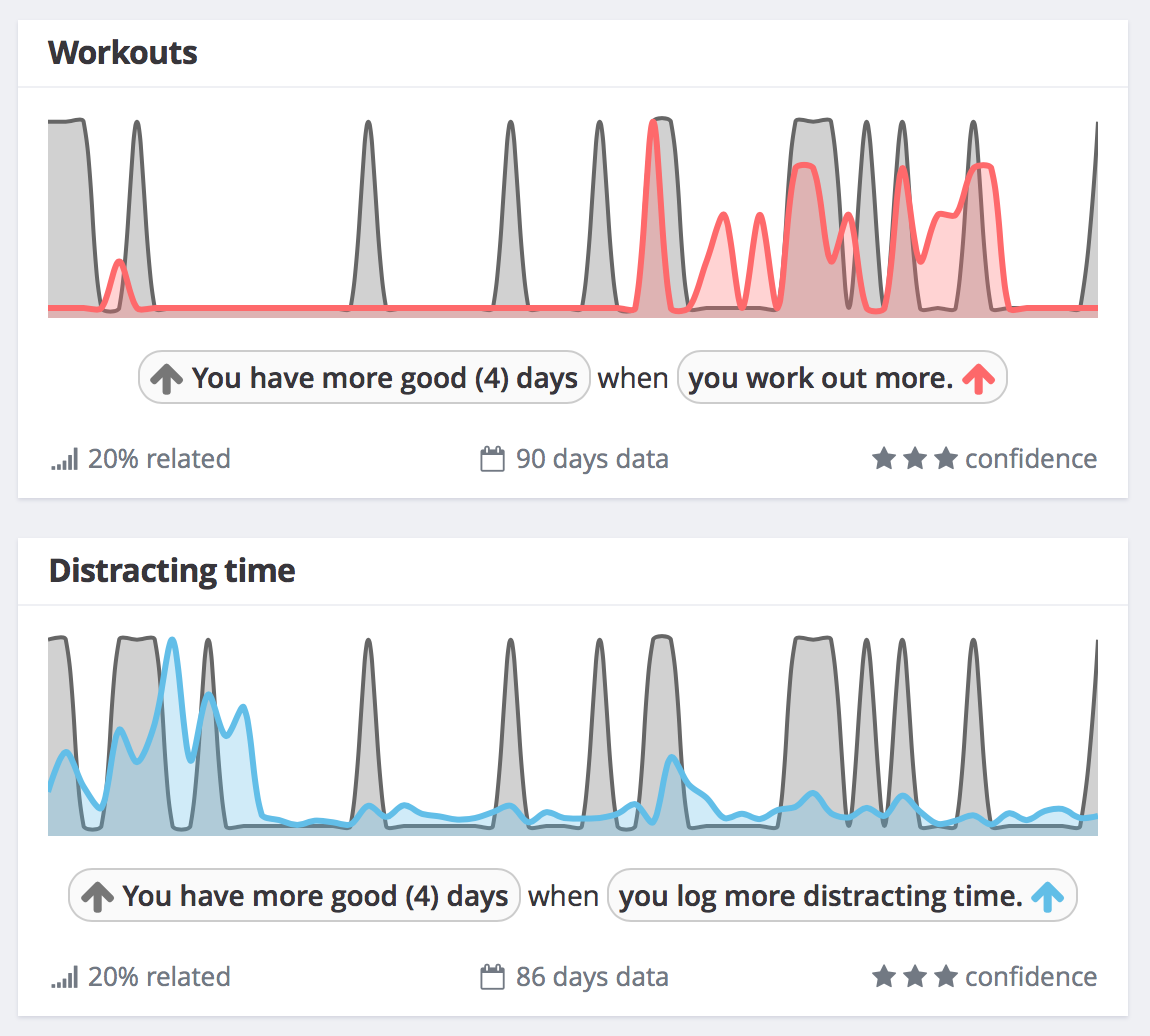
First I looked specifically at days I rated 4/5. I had a few correlations here (they won’t show up if no correlation can be found), so I had a bit to work with. I found out I’m more likely to rate my day as 4/5 when I listen to music, log distracting time on my computer (tracked by RescueTime), and when I work out more. I also have a fairly tentative correlation between 4/5 days and tweeting more, but since it’s not a strong correlation I won’t focus on that one for now.
So I know listening to music, going for a run (those are the only workouts I’ve logged), and distracting time all correlate to a good day. I had a look at RescueTime to see what I do most often that counts as distracting time. It turns out it’s pretty much all related to sitting around watching TV. Most of my distracting time is spent on Netflix, YouTube, or in VLC Media Player.
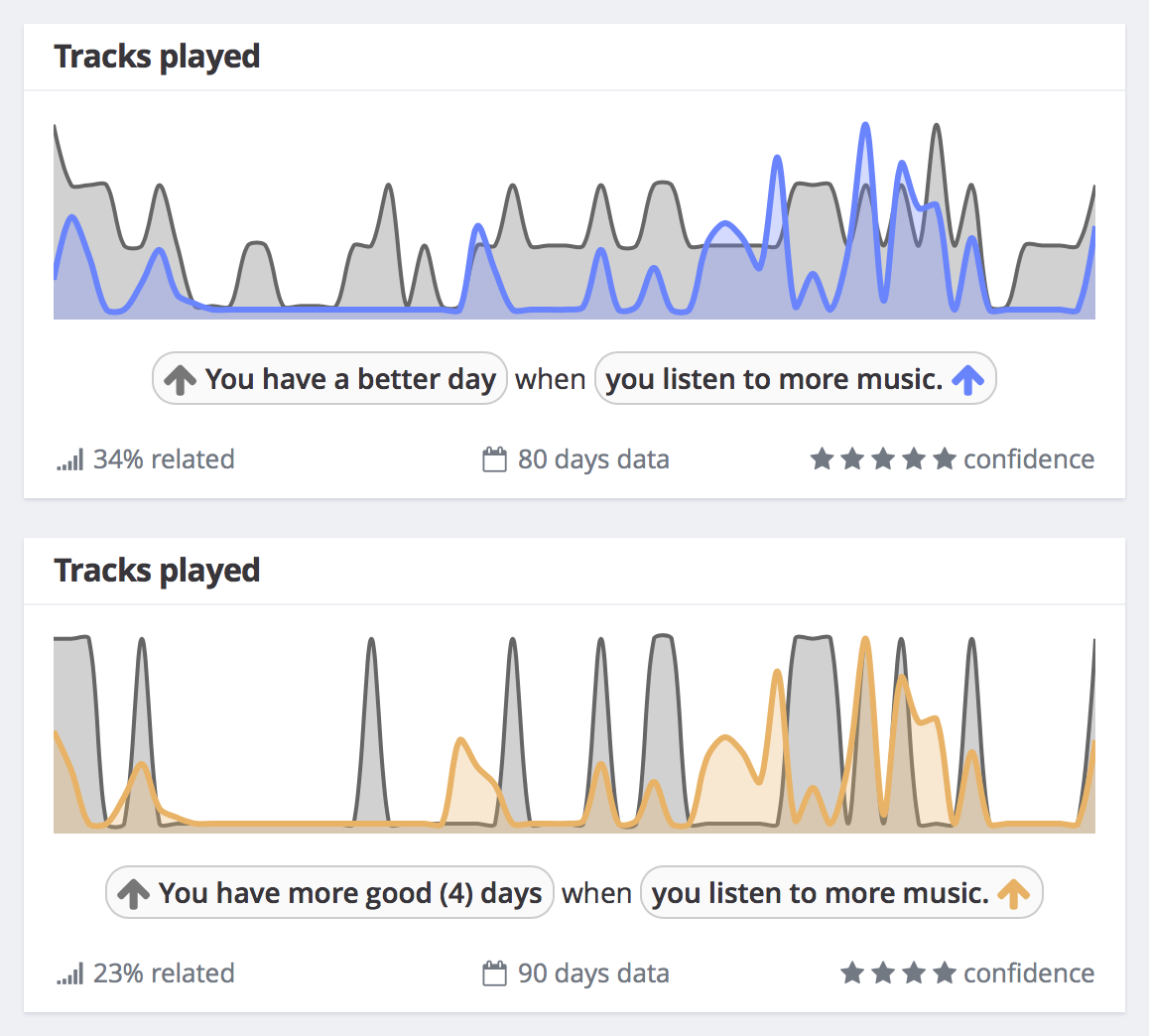
Next I went back to the Exist correlations to see what correlates to a generally better day. Music and workouts both came up again, but so did weekends. I tend to have a better day on weekends. That could be because I was working Mon-Fri for the last few months at Ghost, and had weekends off to rest. Distracting time came up again, but so did the weather: I have a better day when it’s cloudier. I can’t do much to affect the weather, so I won’t dig much into this one.
Now, these correlations are all pulled from the past 90 days of my data. This is the most recent collection of data about what I do, but since I got fired from Ghost about a month ago, and 5 months ago I wasn’t working full-time, using all my data (over a year’s worth for most data points) will give me a more averaged-out idea of what makes me have a good day when I’m not working in a full-time job.
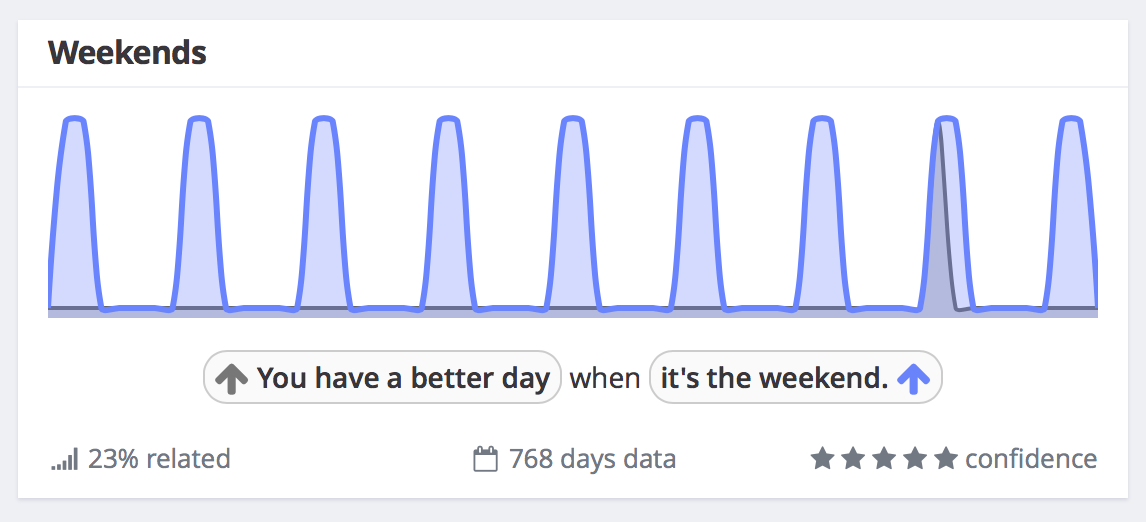
Using all data, I started with 4/5 days again. This time I found that I rate my day 4/5 more often when I’ve spent more time active. This could still be related to running, since we only just integrated workout data into Exist, so previously step counts and active time would have been the only way to tell I’d been running. The only other correlation with 4/5 days from all my data was getting more mentions on Twitter. My guess would be this either comes from being more social and tweeting a lot myself, or from some kind of event where lots of people are mentioning me on a particular day, maybe because an article I published became very popular.
Next I checked with generally better days, to see what correlated to those. I found weekends still showed up, but so did higher step counts and walking a further distance. Seriously, I think Exist is really telling me to bring back my running habit. I can’t really get out of it with this data in my face, can I? Oh wait, workouts also correlate to generally better days. It’s written all over the place. WORK OUT, BELLE.
I also had a look into what makes me have a bad day, but my 1/5 and 2/5 days don’t correlate with anything besides hot nights when I have trouble sleeping. I can only work with the data I have, so it looks like I’ll need to focus on having more good days rather than avoiding the bad ones.
With this data at hand, I started figuring out what habits I could build to make sure I get regular doses of what makes me happy, and how to cut out the things that bring me down.
The main things I want more of if I’m to have more good days are:
- Exercise
- Music
- Watching TV
Watching TV is an easy one (though finding shows I like isn’t so easy). So is listening to music, though lately I’ve found it easier to get things done when I don’t have music playing. One thing to test here would be whether listening to familiar music makes me happier than trying new artists.
Finally, exercise. This the toughest one, but the most obviously correlated with good days. I’ve fallen out of the habit of running many times, because I find it so boring, but one of my goals for this year is to find a different exercise, or a sport, that I enjoy. This should make exercising easier and more fun, so I can do it more often and have more happy days.
Subscribe Keep up to date with the Exist blog. Delivered to your inbox.